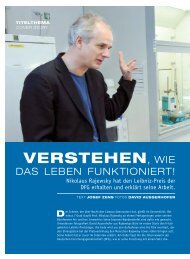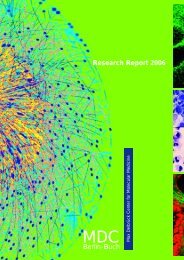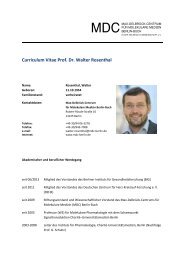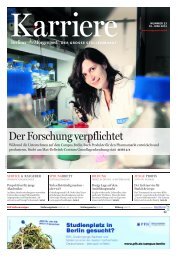Research Report 2010 - MDC
Research Report 2010 - MDC
Research Report 2010 - MDC
You also want an ePaper? Increase the reach of your titles
YUMPU automatically turns print PDFs into web optimized ePapers that Google loves.
Experimental and Clinical <strong>Research</strong> Center (ECRC)Experimental and Clinical <strong>Research</strong> Center (ECRC)The ECRC´s mission is to accelerate the translationof discoveries from fundamental researchinto new procedures for diagnoses, prevention,and therapies for the most common diseases thatthreaten our society. (The focus of the ECRC´sresearch is on cardiovascular and metabolic diseases,cancer, and neurological disease – corresponding tothe research programs of the <strong>MDC</strong>). The ECRC is ajoint institutional infrastructure dedicated to supportingcollaborative research projects and patientorientedresearch and was launched in 2007 by the<strong>MDC</strong> and the Charité.The ECRC creates multiple links between basicresearchers and clinicians, thus fostering the bidirectionaltransfer of knowledge between the two“worlds”, which is considered a key factor for successful“translational” research.The ECRC provides scientists from the Charité and<strong>MDC</strong> extensive opportunities for carrying out translationalprojects:· Clinicians or basic researchers can apply for independentproject groups to conduct a translationalproject within the ECRC. Funding is providedfor three years (extension possible). The fundingdecision is based on a competitive evaluationinvolving external experts.· Clinicians and researchers of the <strong>MDC</strong> can jointlysubmit proposals for collaborative projects whichcan be funded through the ECRC after a competitiveevaluation (KKP program). The projects areconducted at the ECRC and/or the <strong>MDC</strong>.· Within the ECRC, the <strong>MDC</strong> and Charité jointlysponsor a training program for clinicians (KAP, seebelow) in basic molecular biology, in which clinicianstake a break from their duties and join oneof the <strong>MDC</strong>’s laboratories. This promotes longtermcollaborations between the home and host.· Clinicians direct out-patient clinics and carry outclinical studies within the ECRC;· Clinicians and scientists have access to clinicalresearch center (outpatients clinics, beds for clinicaltrials, see below) and technology platforms,(e.g. ultrahigh-field MR instruments, GMP facility,biobanking).Das ECRC hat zum Ziel, die Übertragung vonErkenntnissen der Grundlagenforschung inneue Verfahren zur Vorbeugung, Diagnose undTherapie von Krankheiten unserer Gesellschaft zubeschleunigen. Der Schwerpunkt der Forschung imECRC liegt auf Herz-Kreislauf- und Stoffwechselkrankheiten,Krebs- und neurologischen Erkrankungen undentspricht den Forschungsprogrammen des <strong>MDC</strong>.Seit seiner Gründung im Jahr 2007 bildet das ECRC einegemeinsame institutionelle Infrastruktur von Charitéund <strong>MDC</strong> zur Unterstützung von Kooperationsprojektenund patientenbezogener Forschung. Es zielt daraufab, vielfältige Verbindungen zwischen Grundlagenforschernund Klinikern herzustellen, um auf diese Weiseden Wissensaustausch zwischen den beiden „Welten“zu fördern.Das ECRC eröffnet Wissenschaftlern von Charité und<strong>MDC</strong> weitreichende Möglichkeiten zur Durchführungtranslationaler Projekte:· Kliniker oder Grundlagenforscher können sich umdie Förderung einer unabhängigen Projektgruppebewerben, um ein Translationsprojekt im ECRCdurchzuführen. Die Förderung wird auf der Basiseiner kompetitiven Begutachtung für drei Jahremit der Möglichkeit zur Verlängerung vergeben.· Kliniker und Grundlagenforscher können in einemebenfalls kompetitiven Verfahren gemeinsam dieFinanzierung kooperativer Projekte beantragen(Klinisches Kooperationsprogramm, KKP).Entsprechende Projekte werden in Räumen desECRC und/ oder des <strong>MDC</strong> durchgeführt.· <strong>MDC</strong> und Charité finanzieren im Rahmen des ECRCein gemeinsames Ausbildungsprogramm(Klinisches Ausbildungsprogramm, KAP) für Klinikerin der molekularen Grundlagenforschung. So könnenKliniker für einige Zeit ein Projekt in <strong>MDC</strong>-Laboratorien bearbeiten. Dadurch wird die Basisfür eine spätere längerfristige Zusammenarbeitgeschaffen.· Kliniker betreiben Hochschulambulanzen am ECRCund führen klinische Studien durch.· Klinische und experimentelle Forscher habenZugang zu einem Klinischen Forschungszentrum202 The Experimental and Clinical <strong>Research</strong> Center
















